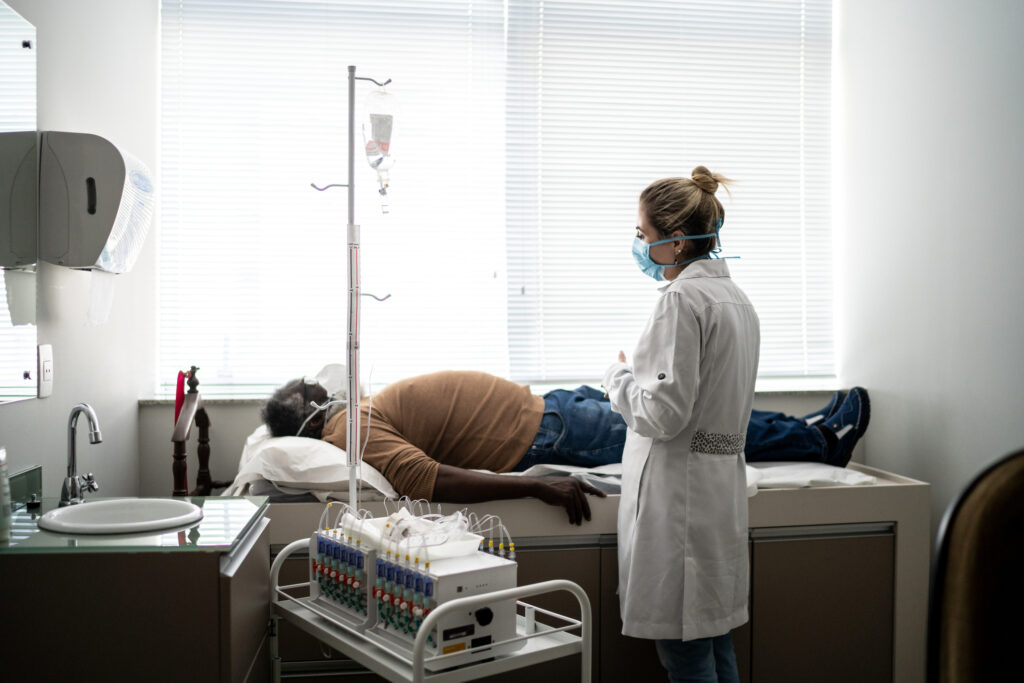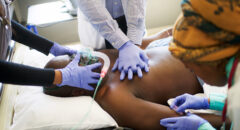
It shouldn’t come as a surprise that there are several deadly diseases that strike Blacks harder and more often than they do other groups, particularly whites.
What are the ones affecting us the most? And more importantly, how can we better fight back?
First, let's look at why these disparities exist:
Why These Disparities?
Genes. Genes definitely play a role. So does the environment in which people live, socioeconomic status -- and, yes, racism, says Clyde W. Yancy, MD, associate dean of clinical affairs and medical director for heart failure/transplantation at the University of Texas Southwestern Medical Center.
Unique Cultural Issues. Yancy says that all humans have the same physiology, are vulnerable to the same illnesses, and respond to the same medicines. Naturally, diseases and responses to treatment do vary from person to person. But, he says, there are unique issues that affect Black Americans.
"We must recognize there are some arbitrary issues that are present in the way we practice medicine and dole out health care," Yancy tells WebMD. "It forces us to think very carefully about the very volatile issue of race and what race means. At the end of the day, it is more likely an issue of socioeconomics and political issues of bias as well as physiologic and genetic issues.
Agreeing with Yancy is LeRoy M. Graham Jr., MD, a pediatric lung expert who serves on the American Lung Association's board of directors, is associate clinical professor of pediatrics at Morehouse School of Medicine in Atlanta, and serves as staff physician for Children's Healthcare of Atlanta.
"I just think we as physicians need to get more impassioned," says Graham. "There are health disparities. But we as doctors need to spend more time recognizing these disparities and addressing them -- together with our patients -- on a very individual level."
Next, here are seven of the diseases affecting African Americans the most:
7. Diabetes
60% more common in Blacks than in whites. Blacks are up to 2.5 times more likely to suffer a limb amputation and up to 5.6 times more likely to suffer kidney disease than other people with diabetes.
Blacks have twice the risk of diabetes as whites. In addition, Blacks with diabetes have more serious complications -- such as loss of vision, loss of limbs, and kidney failure -- than whites, notes Maudene Nelson, RD, certified diabetes educator at Naomi Barry Diabetes Center at Columbia University.
"The theory is that maybe it is access to health care, or maybe a cultural fatalism -- thinking, 'It is God's will,' or, 'My family had it so I have it' -- not a sense of something I can have an impact on so it won't hurt me," says Nelson.
There is, indeed, evidence that Blacks may have a genetic susceptibility to diabetes. Even so, Nelson says, the real problem is empowering patients to keep their diabetes under control, since patients often have the sense that they are not as much in charge of managing their diabetes as their doctor.
It's easy to say people with diabetes should learn how to control their disease. But the tools for this kind of self-empowerment often aren't available in Black neighborhoods, says Elizabeth D. Carlson, DSN, RN, MPH. Carlson, a postdoctoral fellow in the division of cancer prevention and education at the University of Texas M. D. Anderson Cancer Center in Houston, studies the social determinants of health.
"I go to this Black neighborhood 20 minutes from my house in a white neighborhood, and the health education they get in school is much worse than the health education my kids get,” says Carlson. “It is not just formal education, but everyday things. It's being afraid to go out and exercise because you live in a high-crime neighborhood. It's not having transportation to your health care provider. It's not having decent fresh fruits and vegetables in the local grocery."
6. Asthma
The death reflected a harsh reality in the United States: Asthma hits African-Americans particularly hard, and the health care system often fails them. An estimated 15.3 percent of black children have the disease compared with 7.1 percent of white children, according to the Centers for Disease Control and Prevention. Overall, African-Americans are nearly three times as likely to die from asthma as white people.
5. Sarcoidosis
You may not hear it much, but deaths from lung scarring -- sarcoidosis -- are 16 times more common among Blacks than among whites. The disease recently killed Bernie Mac, former NFL star Reggie White at age 43, and affects others like actress Tisha Campbell.
4. Lung Cancer
A 2005 report from the American Lung Association shows that Black Americans suffer far more lung disease than whites do. Despite lower tobacco exposure, Black men are 50% more likely than white men to get lung cancer:
• Blacks have more asthma than any racial or ethnic group in America. And Blacks are 3 times more likely to die of asthma than whites.
• Blacks are 3 times more likely to suffer sarcoidosis than white Americans. The lung-scarring disease is 16 times more deadly for Blacks than for whites.
• Blacks are 50% more likely to get lung cancer than white American men.
• Blacks are half as likely to get flu and pneumonia vaccinations as white Americans.
Why? "There are a couple of reasons for this," Graham says. "One is that 71% of Blacks versus 58% of white Americans live in communities that violate federal air pollution standards. When we look at Blacks in terms of demographic distribution, they are more likely to be located near, if not next to, transportation corridors, and to places where the air is drawn."
Another reason is that a higher percentage of Blacks than whites live close to toxic waste dumps -- and to the factories that produce this waste.
"The environment is involved, and there is potential genetic susceptibility -- but we also have to talk about the fact that Blacks' social and economic status lags behind that of Caucasians," Graham says. "And low socioeconomic status is linked to more disease."
3. Stroke
Strokes kill 4 times more 35- to 54-year-old Black Americans than white Americans. Blacks have nearly twice the first-time stroke risk of whites.
Black Americans have a higher prevalence of stroke and higher death rate from stroke than any other racial group. Stroke is a “brain attack” that most often occurs when blood that brings oxygen to your brain stops flowing and brain cells die.
Black stroke survivors are significantly less likely to be treated for many complications, including fatigue, spasticity and depression, compared with white stroke survivors.
Who's getting strokes in the Black Community?
Younger people (under 65 years) who have diabetes and have an ischemic stroke are more likely to be Black. Ischemic strokes are caused by a blockage in an artery; these account for about 87% of all strokes. Black stroke survivors are more likely to have difficulties doing daily activities. Also, Black stroke survivors are more likely than white stroke survivors to have a second stroke within a year and are more likely to die from that stroke.
Why Do Black People Have More Strokes?
Not all the reasons are clear why Black people have an increased risk of stroke. We do know that there is a higher number of risk factors and societal challenges that may underlie new cases of stroke in Black Americans.
The experience of racism results in chronic discrimination, stress, and depression that adversely impacts Black Americans. Excessive stress can lead to long-lasting and cumulative damage to the body and brain, resulting in deteriorating health in early adulthood among Black populations.
2. Heart Disease
One of the significant risk factors for heart disease is high blood pressure. Blacks develop high blood pressure earlier in life -- and with much higher blood pressure levels -- than whites. According to The American Heart Association, the prevalence of high blood pressure in African Americans is the highest in the world. African American adults are 40% more likely to have high blood pressure than non-Hispanic whites. African American women are about 60% more likely to have high blood pressure than non-Hispanic white women. In addition, African Americans are also more likely to have high cholesterol.
"What sets the stage for the more aggressive and higher incidence of heart disease in Blacks is a very high incidence of high blood pressure," Yancy says. "This predisposes Blacks to more heart disease, kidney disease, stroke and heart failure.”
Clinical trials show Blacks and whites respond differently to treatments for high blood pressure. Indeed, treatment guidelines suggest that doctors should consider different drugs based on a patient's race.
But Yancy says that a closer look at the data shows that race tends to be a marker for more complicated high blood pressure treatment.
"Data suggests that all therapies do equally well -- but patients at higher risk need more intensive therapy," he says.
A similar situation exists for heart failure. A promising treatment for heart failure didn't seem to be working -- until researchers noticed that it worked much better for Black patients than for white patients. A study of Black patients confirmed this finding -- and provided tantalizing evidence that the drug will help patients of all races with certain disease characteristics.
1. Cancer
Cancer treatment is equally successful for all races. Yet Black men have a 40% higher cancer death rate than white men. African American women have a 20% higher cancer death rate than white women.
African Americans have higher rates of getting and dying from many types of cancer than other racial and ethnic groups. In 2022, the American Cancer Society reported that Black people in the United States had 224,080 new cancer cases and 73,680 cancer deaths. Some cancers that affect African Americans include:
Prostate cancer
Black men are twice as likely to die from prostate cancer than non-Hispanic white men.
Breast cancer
Black women are almost 40% more likely to die from breast cancer than non-Hispanic white women. In 2019, breast cancer became the leading cause of cancer death for Black women, surpassing lung cancer.
Stomach cancer
Black women are twice as likely to be diagnosed with stomach cancer and 2.3 times more likely to die from it than non-Hispanic white women. Black men also have a double risk of death from stomach cancer.
Endometrial cancer
Black women have a double mortality rate for endometrial cancer.
(Honorable Mention) Sickle Cell Anemia
Just because it didn't make it on the list, doesn't mean we shouldn't pay attention to the alarming statistics ravaging our Black communities. By now, you probably know that sickle cell anemia affects Blacks far more than it does whites.
This, clearly, is a genetic disease that has little to do with the environment. Yet even here -- with a killer disease -- social and political issues come into play. Graham notes that the cause of sickle cell anemia has been known since the 1950s. But for many generations, he says, sickle cell anemia has not had the funding and research attention it deserves.
"If you look at the time and attention devoted to sickle cell anemia, it pales when compared to cystic fibrosis and other genetic diseases," Graham says. "There are actually more Americans with sickle cell disease than with cystic fibrosis -- 65,000 to 80,000 versus 35,000 to 40,000 -- but the amount of money spent on cystic fibrosis research outstrips sickle cell anemia by manyfold. This is a shame on the medical research arm of our nation."
How Are These Disparities Being Dealt With For The Future?
To its credit, Graham says, the National Institutes of Health is changing this situation. One reason for this change -- as research into lung disease, heart disease, and diabetes shows -- is the growing realization that the health of Black Americans isn't a racial issue, but a human issue.
What does overcoming these issues mean? It means overcoming disparities in health care. It means investments targeted to the health of Black Americans. And the evidence so far indicates that these investments will pay health dividends not just for racial minorities, but for everyone.








